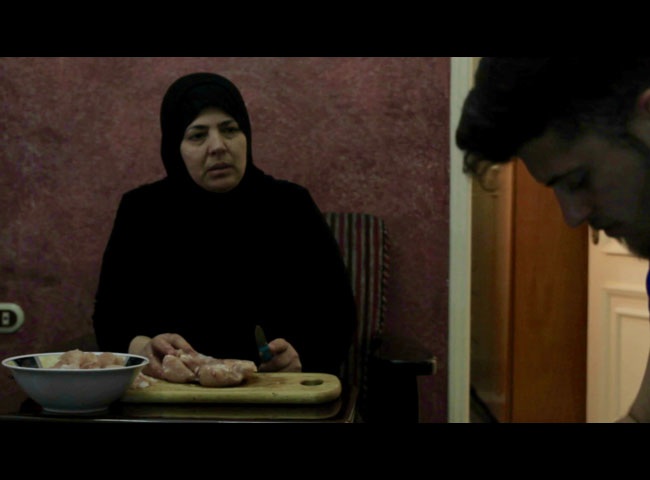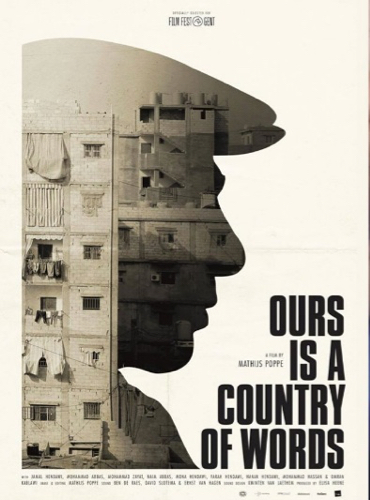Ours Is a Country of Words
-
Réalisé par Mathijs Poppe • Écrit par Mathijs Poppe
-
Belgique • 2017 • 42 minutes • Couleur
- Réalisation :
Mathijs Poppe - Écriture :
Mathijs Poppe - Image :
Mathijs Poppe - Son :
Ben De Raes, David Slotema, Ernst Van Hagen - Montage :
Mathijs Poppe
- Production (structure) :
KASK Hogeschool Gent School of Arts - KASK School of Arts & Conservatorium - Coproduction :
Elisa Heene - Ayant droit :
KASK Hogeschool Gent School of Arts - KASK School of Arts & Conservatorium
- N° ISAN :
non renseigné
Résumé
""Ce film raconte une histoire qui a commencé en 1948, quand des milliers de Palestiniens quittèrent leur pays, fuyant les massacres. Nous reprenons cette histoire des années plus tard, dans un futur imaginaire. Un futur dans lequel la Palestine est libre à nouveau". Ainsi s'ouvre le film de Mathijs Poppe, qui, en créant avec des habitants du camp de Chatila la fiction d'un retour possible, écrit en creux une histoire de la Palestine et des Palestiniens. Au fil des rues étroites, dans les appartements exigus où s'entassent des familles entières, les cadres serrés et l'image en clair-obscur révèlent une vie d'attente, suspendue. Refaire les passeports, vendre la machine à laver pour acheter une voiture, contacter les colons israéliens qui occupent la maison pour prévenir de son retour : chacun s'affaire à préparer le voyage vers la terre natale ou fantasmée. Ceux qui ne l'ont jamais vue en font le tableau imaginaire, décrivant la beauté d'un paysage idéal qui à chaque phrase rend plus cruelle la réalité du camp. Car ce pays de mots, même inaccessible, est le berceau d'une identité forgée dans l'exil, vivante envers et contre tout.
(Céline Guénot - Visions du Réel)
""This film tells a story that started in 1948, when thousands of Palestinians fled their country, in fear of the ongoing the massacres. We will pick the story up years later, in an imaginary future. A future in which Palestine is free again." Thus opens the film by Mathijs Poppe, who, by creating the fiction of a possible return with the inhabitants of the Shatila camp, implicitly writes a history of Palestine and the Palestinians. Over the narrow streets, in the confined apartments into which entire families are crammed, the tight frames and the image in chiaroscuro reveal a life of waiting, suspended. Redoing passports, selling the washing machine to buy a car, contacting the Israeli setlers who are occupying the house to warn them of their return: everyone is busy themselves preparing the voyage to the home or dreamed land. Those who have never seen it make an imaginary tableau of it, describing the beauty of an ideal landscape that makes the reality of the camp crueller with each sentence. For, this country of words, even inaccessible, is the cradle of an identity forged in exile, alive despite and against everything."
(Céline Guénot - Visions du Réel)
Mot(s)-clé(s) thématique(s)
Sélections et distinctions
- 2020 • Ciné-Palestine Toulouse Occitanie • Toulouse (France) • Sélection
- 2018 • Les Écrans Documentaires • Arcueil (France) • Sélection Premiers films
- 2018 • Visions du Réel • Nyon (Suisse) • Compétition Internationale Moyens et Courts Métrages
- 2017 • Film Fest Gent • Gent (Belgique) • Sélection
Comment avoir accès au film ?
- Sortie en salle
-
Édition DVD
- Il n'existe pas d'édition DVD à notre connaissance
-
Accès VOD
- Il n'existe pas d'accès en VOD à notre connaissance
- Distribution
- Aide sur les moyens d'accéder à un film

